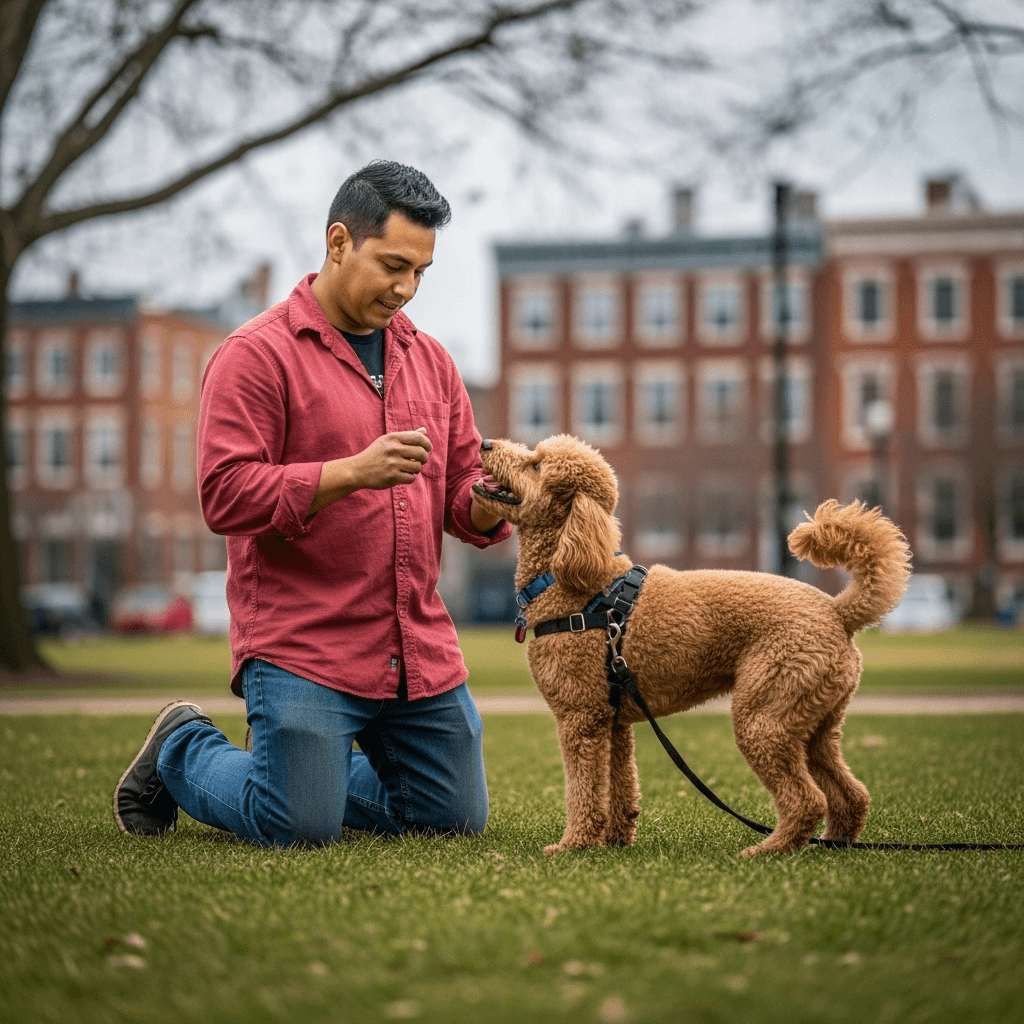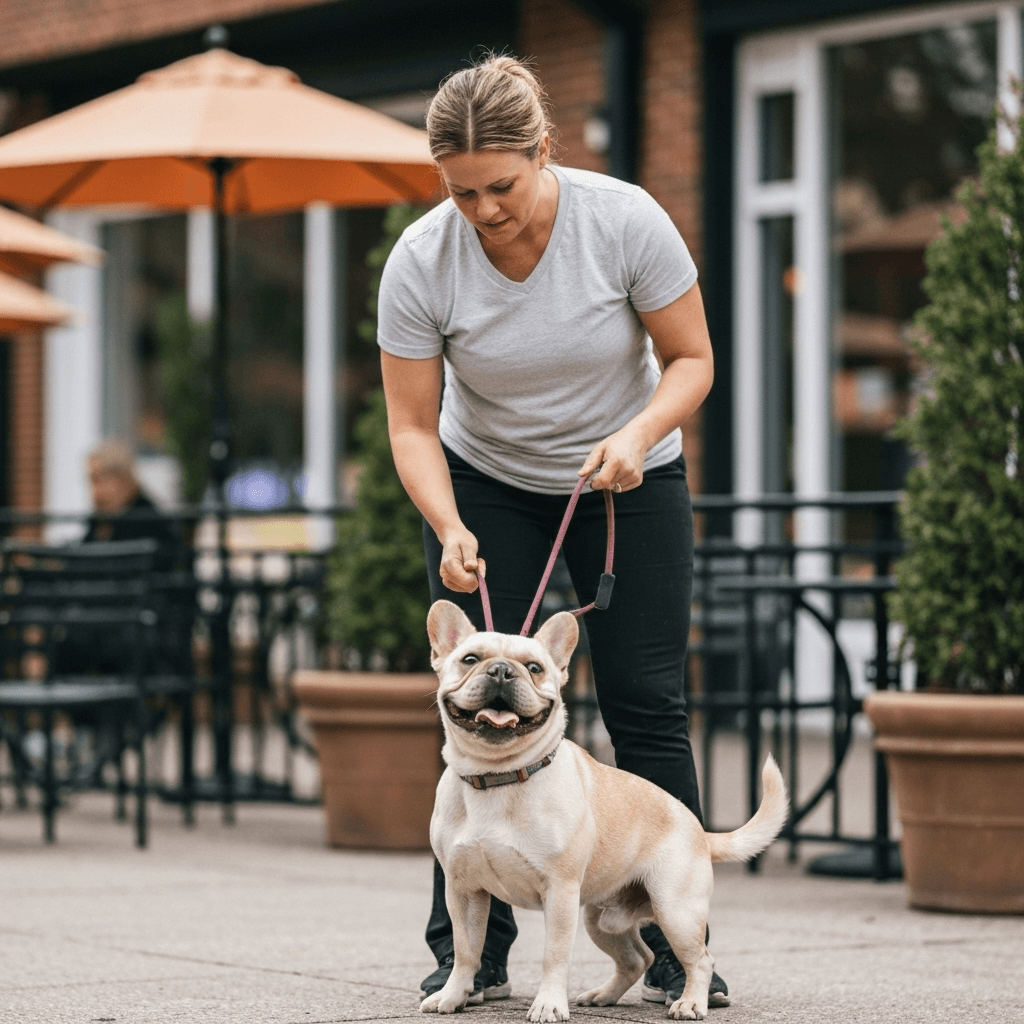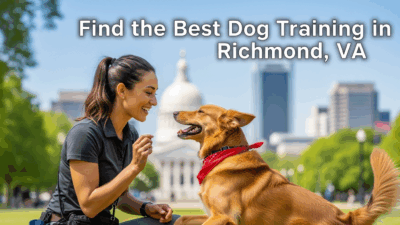Your Complete Guide to Choosing a Dog Trainer in Richmond VA
Living with a dog in Richmond means navigating city parks, historic neighborhoods, and busy downtown streets. Your dog needs to handle all of this calmly, from loose-leash walks along the Canal Walk to staying polite when crowds gather for festivals in Carytown or events on Brown’s Island.
Richmond sits in the City of Richmond, which operates as an independent city separate from surrounding counties. When you find a professional dog trainer who understands these local details, you’ll get better results both at home and out in your community.
How to Choose the Right Trainer
Start by looking for someone who uses positive reinforcement training and can set realistic goals for your Richmond lifestyle. This means your dog should learn to walk calmly through the Fan District, stay focused near busy restaurant patios in Scott’s Addition, and handle vet visits without drama.
Credentials give you a quick way to compare trainers’ experience levels. Common dog trainer certifications include KPA-CTP, CPDT-KA, or IAABC-CDBC for behavior problems. If your dog has serious aggression issues, look for someone with CBCC-KA or a science-based program like CTC.
In-home dog training works great for puppy training, door greetings, and neighborhood leash skills. Group classes make sense once your dog can focus around other dogs, especially before you try busy spots like Byrd Park or Belle Isle.
Common Dog Training Methods Explained

Reward-based methods build the trust you want while creating lasting behavior changes. They also help you follow Richmond’s rules about keeping dogs under control in public.
Basic obedience covers sit, down, stay, place, recall, and leash training so your dog can handle walks, restaurant patios, and park visits without pulling or jumping on people. These skills become essential when you’re navigating crowded sidewalks in Shockoe Bottom or waiting for the crosswalk light on Monument Avenue.
Puppy classes focus on socialization, potty training, bite control, crate comfort, and early leash work. Starting with short, positive sessions prevents bad habits from forming in the first place. Richmond puppies need extra exposure to city sounds, bikes, and delivery trucks to become confident adult dogs.
Behavior modification addresses fear, reactivity, resource guarding, or separation anxiety through careful desensitization and counterconditioning. For serious cases, ask if your trainer works with local veterinarians who understand behavioral medication.
Private lessons and in-home sessions let you customize everything around your daily routines, while day training can speed up results when you’re short on time. Board and train programs work for intensive needs but should always include handoff sessions so you learn to maintain the progress.
Group classes help your dog practice good manners around other dogs and people. The best dog training classes give dogs plenty of space, screen participants carefully, and teach calm behavior rather than just excitement.
Specialized training like therapy dog training or service dog training requires extra structure, public-access skills, and a very clear step-by-step program. Richmond’s hospitals and universities often welcome certified therapy dogs once they complete proper training.
Stay away from trainers who use fear, intimidation, or pain to get results. Humane methods are safer for everyone, easier to maintain long-term, and much better for keeping peace with your neighbors in tight-knit communities like Church Hill or the Museum District.
Average Cost of Dog Training in Richmond VA (Updated for 2025)
Prices around Richmond depend on the trainer’s experience, how long training sessions last, and where the training happens. Here’s what most local pet owners are paying in 2025.
| Service Type | Average Cost (Richmond) |
|---|---|
| Puppy classes (4-6 weeks) | $160-$290 total |
| Group obedience classes (4-6 weeks) | $170-$310 total |
| Private lessons (60-90 min) | $120-$200 per session |
| In-home coaching packages (4-6 visits) | $450-$950 total |
| Day training (trainer works your dog + handoff) | $475-$1,000 per week |
| Behavior consult for reactivity/anxiety (initial) | $160-$275 |
| Board and train (2-4 weeks) | $2,200-$4,800 total |
You’ll probably pay extra travel fees for longer distances within the Richmond metro area, and expect higher rates for complex behavior work or aggressive dog training needs.
Make sure you understand what’s included in your training program, how the trainer tracks progress, and whether they offer a free consultation or free evaluation before you sign up.
Questions to Ask a Potential Dog Trainer
- What training methods do you use, and how do you keep sessions positive and low-stress?
- What credentials do you have, like KPA-CTP or CPDT-KA? Do you keep up with continuing education such as CPDT-KSA?
- How will you customize the training plan for my dog’s specific needs and our Richmond lifestyle?
- Do you offer in-home visits, group classes, or day training, and which approach fits my goals best?
- How will we measure my dog’s progress and know when to add more distractions?
- What are the total costs, including any travel fees, and what’s your cancellation policy?
- Do you carry liability insurance, and can you show me proof?
- For behavior problems, will you work with my veterinarian if needed?
- What should I practice between our sessions to help my dog keep improving?
- Have you worked with dogs in urban environments like Richmond before?
Local Richmond Rules and Considerations
Richmond enforces leash laws and animal control regulations to keep parks and neighborhoods safe for everyone. The City of Richmond also follows Virginia’s public health requirements.
Leashes are required in all public spaces except inside designated dog parks. Keep a standard 6-foot leash with you for city sidewalks, parks, and community events. Retractable leashes don’t count as proper restraint under Richmond’s code.
Virginia law requires current rabies vaccination for all dogs. Richmond residents must also register their dogs with the city and obtain an annual dog license through the Richmond Animal Care and Control. License fees are reduced if your dog is spayed or neutered.
Excessive barking can be considered a nuisance under Richmond’s noise ordinance. Work with your trainer on alert barking and separation anxiety before neighbors start complaining, especially if you live in a rowhouse or apartment building.
If your trainer wants to use city parks for commercial sessions, they may need permits and proof of liability insurance. Check with Richmond Parks and Recreation for current regulations.
Virginia doesn’t require special licenses for dog trainers, but trainers who board dogs for payment must follow the Virginia Department of Agriculture’s boarding facility regulations. You can verify facility licensing through the Virginia Department of Agriculture and Consumer Services.
Local Richmond Resources for Dog Owners
These spots give you great places to practice polite manners, work on recalls, and provide safe enrichment to help your dog become a well-behaved dog. Always follow the posted rules and etiquette guidelines.
- Barker Field at Byrd Park offers fully fenced areas for small and large dogs with separate sections. Practice recalls and calm greetings during quieter times of day.
- Rockwood Park Dog Park in South Richmond provides another fenced option with shade trees and water stations. This spot works well for building confidence in dogs who get overwhelmed easily.
- Chimborazo Park Dog Park in Church Hill gives you a neighborhood option with great views and a tight-knit community of regulars who can help with socialization.
- Belle Isle offers leashed trails perfect for practicing focus around joggers, cyclists, and families. The river access also provides swimming opportunities for water-confident dogs.
- Texas Beach allows leashed dogs and gives you natural terrain for building endurance and confidence around environmental distractions.
- Capital Trees is a local nonprofit that hosts community events where well-behaved dogs are often welcome, providing real-world practice opportunities.

FAQs
How much does in-home dog training cost?
Most Richmond trainers charge $120-$200 per in-home visit, with discounts available when you buy packages. Behavior problems typically start at the higher end of that range, especially for reactivity or separation anxiety issues.
Is in-home dog training worth it?
Absolutely, because you’re working on problems exactly where they happen. Your trainer can fix door manners, jumping on guests, counter-surfing, and yard reactivity right at home, then step outside to practice leash skills on your actual neighborhood sidewalks in the Fan or Church Hill.
Can you pay someone to house train your dog?
Yes, many trainers offer puppy programs that include potty training, crate routines, and daily schedules. Day training can speed up the process while teaching you how to maintain the progress, which helps a lot if you work long hours downtown.
What is the 3-3-3 rule for dog training?
This is a helpful timeline for new or adopted dogs: expect about 3 days for your dog to decompress, 3 weeks to learn your routines, and 3 months to feel completely settled. Good training plans work with this natural adjustment period rather than rushing results.
How long will it take to reach my training goals?
Most puppies and friendly adult dogs show solid progress within 4-8 weeks if you practice daily. Fear, reactivity, or aggression typically requires several months of careful behavior modification with gradual increases in difficulty, especially in a busy urban environment like Richmond.
What should I bring to group classes?
Pack a flat collar or harness, a 6-foot leash, high-value treats, water, and current vaccination records if your trainer requests them. Leave retractable leashes at home for safety reasons, and bring your dog’s license tag if the class meets in city facilities.
What’s the leash law in Richmond?
Dogs must be leashed and under control in all public areas, except inside designated off-leash dog parks. Keep that 6-foot leash handy for city greenways, Canal Walk, and community events throughout Carytown and Scott’s Addition.
Do I need a dog license in Richmond?
Yes, Richmond requires all dog owners to register their pets and obtain an annual dog license. You can apply through Richmond Animal Care and Control with proof of current rabies vaccination. License fees are lower for spayed or neutered dogs.
What shots does my dog need in Richmond or Virginia?
Rabies vaccination is required throughout Virginia. Your veterinarian may also recommend distemper-parvo, bordetella, leptospirosis, and Lyme disease based on your dog’s lifestyle. Check state guidelines through the Virginia Department of Health.
Are dog trainers required to be licensed in Richmond or Virginia?
No special trainer licenses exist in Virginia. Trainers follow normal business regulations, but if they offer board and train services, their facility must be licensed as a boarding kennel under Virginia Department of Agriculture regulations.
Where can I practice off-leash recall?
Use fenced dog parks like Barker Field, Rockwood Park Dog Park, or Chimborazo Park Dog Park to keep things safe and legal. Try visiting during quieter hours when you’re starting out to help your dog build confidence without getting overwhelmed.
Which dog parks allow training around Richmond?
All three major Richmond dog parks allow off-leash play and training within their fenced areas. Barker Field at Byrd Park is the largest and most popular, while Rockwood and Chimborazo offer more neighborhood-focused environments perfect for early socialization work.
What trails allow dogs for training?
Belle Isle welcomes leashed dogs on all trails and provides natural terrain for building focus around wildlife, bikes, and other hikers. Texas Beach also allows leashed dogs and offers river access for confident swimmers. The Virginia Capital Trail permits leashed dogs along its entire 52-mile route, with the Richmond sections perfect for longer training walks.
How do I find expert dog trainers in Richmond?
Look for certified dog trainers with credentials like CPDT-KA, KPA-CTP, or IAABC-CDBC who use positive reinforcement methods. Ask about their experience with Richmond’s urban environment, check if they offer a free evaluation, and request references from local clients in neighborhoods similar to yours.
Can training help with my dog’s separation anxiety?
Yes, behavior modification protocols can significantly reduce separation anxiety through gradual desensitization and building independence. Work with a certified professional who understands the specific challenges of Richmond living, where thin walls and close neighbors make barking problems more urgent.
What if my dog is reactive to other dogs on walks?
Reactivity requires a structured behavior modification program with a qualified trainer who understands counterconditioning and desensitization. Richmond’s dense neighborhoods and busy sidewalks make this work challenging but manageable with the right training approach and consistent practice during low-traffic hours.
The right combination of thoughtful planning, humane methods, and consistent practice around Richmond’s parks and historic neighborhoods will help your dog become a confident, well-behaved companion. If credentials matter to you, don’t hesitate to ask about dog trainer certifications and how your trainer stays current with new techniques through ongoing education.
